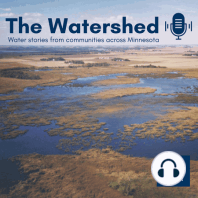15 min listen
12 | For the Fish (Lake City, MN)
FromThe Watershed
ratings:
Length:
20 minutes
Released:
Apr 29, 2022
Format:
Podcast episode
Description
The We Are Water MN exhibit is on the road for its 2022 tour. Throughout the year, We Are Water MN will be visiting five different communities in the state of Minnesota: Winona, Lake City, Alexandria, Otter Tail County, and Dakota County. On The Watershed podcast, we’ll be sharing series of episodes that reflect on the water stories of people who live in each of these places.
We Are Water has now arrived at Lake City, where the Lake Pepin Legacy Alliance is hosting the exhibit at the Lake City Public Library April 28 through June 20. Learn more: https://www.lakepepinlegacyalliance.org/we-are-water-mn
Situated on the shore of Lake Pepin, Lake City residents are no strangers to water. Today, we orient ourselves to Lake City’s connection with water through the lens of a popular way of life here: fishing.
We are Water MN is led by the Minnesota Humanities Center in partnership with the Minnesota Pollution Control Agency; the Minnesota Historical Society; the Minnesota Departments of Agriculture, Health, and Natural Resources; and University of Minnesota Extension, with support from the Clean Water, Land & Legacy Amendment and the National Endowment for the Humanities.
To learn more about We Are Water MN, visit us at our website. Follow us on Facebook and Twitter.
We Are Water has now arrived at Lake City, where the Lake Pepin Legacy Alliance is hosting the exhibit at the Lake City Public Library April 28 through June 20. Learn more: https://www.lakepepinlegacyalliance.org/we-are-water-mn
Situated on the shore of Lake Pepin, Lake City residents are no strangers to water. Today, we orient ourselves to Lake City’s connection with water through the lens of a popular way of life here: fishing.
We are Water MN is led by the Minnesota Humanities Center in partnership with the Minnesota Pollution Control Agency; the Minnesota Historical Society; the Minnesota Departments of Agriculture, Health, and Natural Resources; and University of Minnesota Extension, with support from the Clean Water, Land & Legacy Amendment and the National Endowment for the Humanities.
To learn more about We Are Water MN, visit us at our website. Follow us on Facebook and Twitter.
Released:
Apr 29, 2022
Format:
Podcast episode
Titles in the series (59)
Beautiful Homes, Nice Yards by The Watershed
